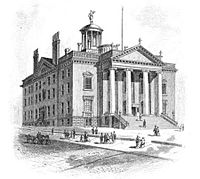77th New York State Legislature
| 77th New York State Legislature | |||||
|---|---|---|---|---|---|
|
|||||

The Old State Capitol (1879)
|
|||||
| Overview | |||||
| Jurisdiction | New York, United States | ||||
| Term | January 1 – December 31, 1854 | ||||
| Senate | |||||
| Members | 32 | ||||
| President | Lt. Gov. Sanford E. Church (D) | ||||
| Temporary President | Andrew B. Dickinson (W), from January 30 | ||||
| Party control | Whig (23-9) | ||||
| Assembly | |||||
| Members | 128 | ||||
| Speaker | Robert H. Pruyn (W) | ||||
| Party control | Whig (80-25-18-5) | ||||
| Sessions | |||||
|
|||||
| 1st | January 3 – April 17, 1854 |
|---|
The 77th New York State Legislature, consisting of the New York State Senate and the New York State Assembly, met from January 3 to April 17, 1854, during the second year of Horatio Seymour's governorship, in Albany.
Under the provisions of the New York Constitution of 1846, 32 Senators were elected in single-seat senatorial districts for a two-year term, the whole Senate being renewed biennially. The senatorial districts (except those in New York City) were made up of entire counties. 128 Assemblymen were elected in single-seat districts to a one-year term, the whole Assembly being renewed annually. The Assembly districts were made up of entire towns, or city wards, forming a contiguous area, all in the same county. The City and County of New York was divided into four senatorial districts, and 16 Assembly districts.
At this time there were two major political parties: the Democratic Party and the Whig Party.
The Democratic Party was split into two factions: the Hard-Shells (or Hards) and the Soft-Shells (or Softs). In 1848, the Democratic Party had been split into Barnburners and Hunkers. The Barnburners left the party, and ran as the Free Soil Party, with presidential candidate Martin Van Buren. Afterwards the larger part of the Free Soilers re-joined the Democratic Party. During the following years, the Hunkers split over the question of reconciliation with the Barnburners. The Hards were against it, denying the Barnburners to gain influence in the Party. The Softs favored reconciliation with the intention of maintaining enough strength to win the elections. Both Hards and Softs favored a compromise on the slavery question: to maintain the status quo and to leave the decision to the local population in new Territories or States if they want slavery or not, as expressed in the Kansas-Nebraska Act. The Barnburners were against the permission of slavery in new Territories or States, but were now the minority in the party. The small faction of the Free Soil Party which advocated abolition of slavery, ran their own State ticket as the "Free Democratic Party".
...
Wikipedia
